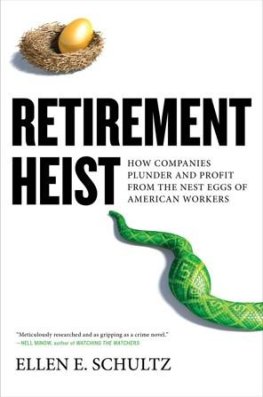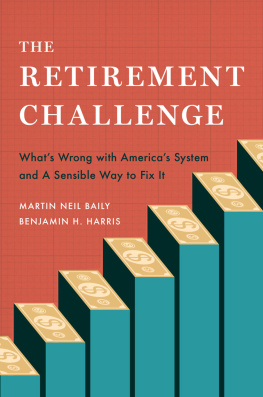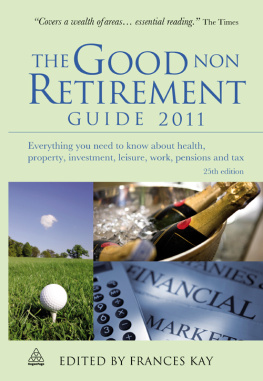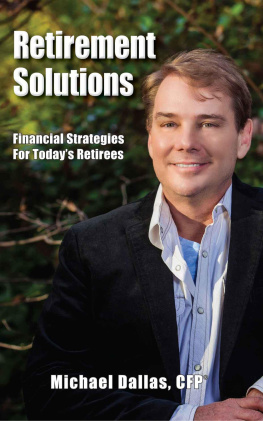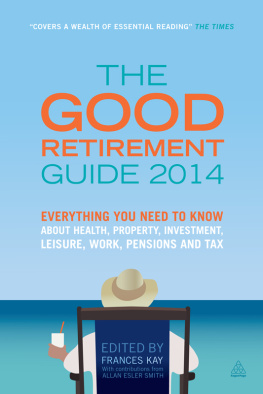Ellen E. Schultz
RETIREMENT HEIST
How Companies Plunder and Profit from the Nest Eggs of American Workers
PORTFOLIO / PENGUIN
Published by the Penguin Group
Penguin Group (USA) Inc., 375 Hudson Street,
New York, New York 10014, U.S.A.
Penguin Group (Canada), 90 Eglinton Avenue East, Suite 700, Toronto,
Ontario, Canada M4P 2Y3 (a division of Pearson Penguin Canada Inc.)
Penguin Books Ltd, 80 Strand, London WC2R 0RL, England
Penguin Ireland, 25 St. Stephens Green, Dublin 2, Ireland
(a division of Penguin Books Ltd)
Penguin Books Australia Ltd, 250 Camberwell Road, Camberwell,
Victoria 3124, Australia (a division of Pearson Australia Group Pty Ltd)
Penguin Books India Pvt Ltd, 11 Community Centre,
Panchsheel Park, New Delhi110 017, India
Penguin Group (NZ), 67 Apollo Drive, Rosedale, Auckland 0632,
New Zealand (a division of Pearson New Zealand Ltd)
Penguin Books (South Africa) (Pty) Ltd, 24 Sturdee Avenue,
Rosebank, Johannesburg 2196, South Africa
Penguin Books Ltd, Registered Offices: 80 Strand, London WC2R 0RL, England
First published in 2011 by Portfolio / Penguin, a member of Penguin Group (USA) Inc.
Copyright Ellen E. Schultz, 2011
All rights reserved
LIBRARY OF CONGRESS CATALOGING-IN-PUBLICATION DATA Schultz, Ellen. Retirement heist: how companies plunder and profit from the nest eggs of American workers / Ellen E. Schultz. p. cm. Includes bibliographical references and index.
ISBN : 978-1-101-44607-2
1. PensionsUnited States. 2. CorporationsMoral and ethical aspectsUnited States. 3. Life insurance policiesUnited States. I. Title.
HD7125.S38 2011
331.2520973dc22
2011015064
Without limiting the rights under copyright reserved above, no part of this publication may be reproduced, stored in or introduced into a retrieval system, or transmitted, in any form or by any means (electronic, mechanical, photocopying, recording, or otherwise), without the prior written permission of both the copyright owner and the above publisher of this book.
The scanning, uploading, and distribution of this book via the Internet or via any other means without the permission of the publisher is illegal and punishable by law. Please purchase only authorized electronic editions and do not participate in or encourage electronic piracy of copyrightable materials. Your support of the authors rights is appreciated.
http://us.penguingroup.com
IN DECEMBER 2010, General Electric held its Annual Outlook Investor Meeting at Rockefeller Center in New York City. At the meeting, chief executive Jeffrey Immelt stood on the Saturday Night Live stage and gave the gathered analysts and shareholders a rundown on the global conglomerates health. But in contrast to the iconic comedy show that is filmed at Rock Center each week, Immelts tone was solemn. Like many other CEOs at large companies, Immelt pointed out that his firms pension plan was an ongoing problem. The pension has been a drag for a decade, he said, and it would cause the company to lose thirteen cents per share the next year. Regretfully, to rein in costs, GE was going to close the pension plan to new employees.
The audience had every reason to believe him. An escalating chorus of bloggers, pundits, talk show hosts, and media stories bemoan the burgeoning pension-and-retirement crisis in America, and GE was just the latest of hundreds of companies, from IBM to Verizon, that have slashed pensions and medical benefits for millions of American retirees. To justify these cuts, companies complain that theyre victims of a perfect storm of uncontrollable economic forcesan aging workforce, entitled retirees, a stock market debacle, and an outmoded pension system that cripples their chances of competing against pensionless competitors and companies overseas.
What Immelt didnt mention was that, far from being a burden, GEs pension and retiree plans had contributed billions of dollars to the companys bottom line over the past decade and a half, and were responsible for a chunk of the earnings that the executives had taken credit for. Nor were these retirement programseven with GEs 230,000 retireesbleeding the company of cash. In fact, GE hadnt contributed a cent to the workers pension plans since 1987 but still had enough money to cover all the current and future retirees.
And yet, despite all this, Immelts assessment wasnt entirely inaccurate. The company did indeed have another pension plan that really was a burden: the one for GE executives. And unlike the pension plans for a quarter of a million workers and retirees, the executive pensions, with a $4.4 billion obligation, have always been a drag on earnings and have always drained cash from company coffers: more than $573 million over the past three years alone.
So a question remains: With its fully funded pension plan, why was GE closing its pensions?
That is one of the questions this book seeks to answer. Retirement Heist explains what really happened to GEs pensions as well as to the retirement benefits of millions of Americans at thousands of companies. No one disputes that theres a retirement crisis, but the crisis was no demographic accident. It was manufactured by an alliance of two groups: top executives and their facilitators in the retirement industrybenefits consultants, insurance companies, and banksall of whom played a huge and hidden role in the death spiral of American pensions and benefits.
Yet, unlike the banking industry, which was rightly blamed for the subprime mortgage crisis, the masterminds responsible for the retirement crisis have walked away blame-free. And, unlike the pension raiders of the 1980s, who killed pensions to extract the surplus assets, they face no censure. If anything they are viewed as beleaguered captains valiantly trying to keep their overloaded ships from being sunk in a perfect storm. In reality, theyre the silent pirates who looted the ships and left them to sink, along with the retirees, as they sailed away safely in their lifeboats.
The roots of this crisis took hold two decades ago, when corporate pension plans, by and large, were well funded, thanks in large part to rules enacted in the 1970s that required employers to fund the plans adequately and laws adopted in the 1980s that made it tougher for companies to raid the plans or use the assets for their own benefit. Thanks to these rules, and to the long-running bull market that pumped up assets, by the end of the 1990s pension plans at many large companies had such massive surpluses that the companies could have fully paid their current and future retirees pensions, even if all of them lived to be ninety-nine and the companies never contributed another dime.
But despite the rules protecting pension funds, U.S. companies siphoned billions of dollars in assets from their pension plans. Many, like Verizon, used the assets to finance downsizings, offering departing employees additional pension payouts in lieu of cash severance. Others, like GE, sold pension surpluses in restructuring deals, indirectly converting pension assets into cash.
To replenish the surplus assets in their pension piggy banks, companies cut benefits. Initially, employees didnt question why companies with multi-billion-dollar pension surpluses were cutting pensions that werent costing them anything, because no one noticed their pensions were being cut. Employers used actuarial sleight of hand to disguise the cuts, typically by changing the traditional pensions to seemingly simple account-style plans.
Cutting benefits provided a secondary windfall: It boosted earnings, thanks to new accounting rules that required employers to put their pension obligations on their books. Cutting pensions reduced the obligations, which generated gains that are added to income. These accounting rules are the Rosetta Stone that explains why companies with massively overfunded pension plans went on a pension-cutting spree and began slashing retiree health benefits even when their costs were falling. By giving companies an incentive to reduce the liability on their books, the accounting rules turned retiree benefits plans into cookie jars of potential earnings enhancements and provided employers with the means to convert the trillion dollars in pensions and retiree benefits into an immediate, dollar-for-dollar benefit for the company.

